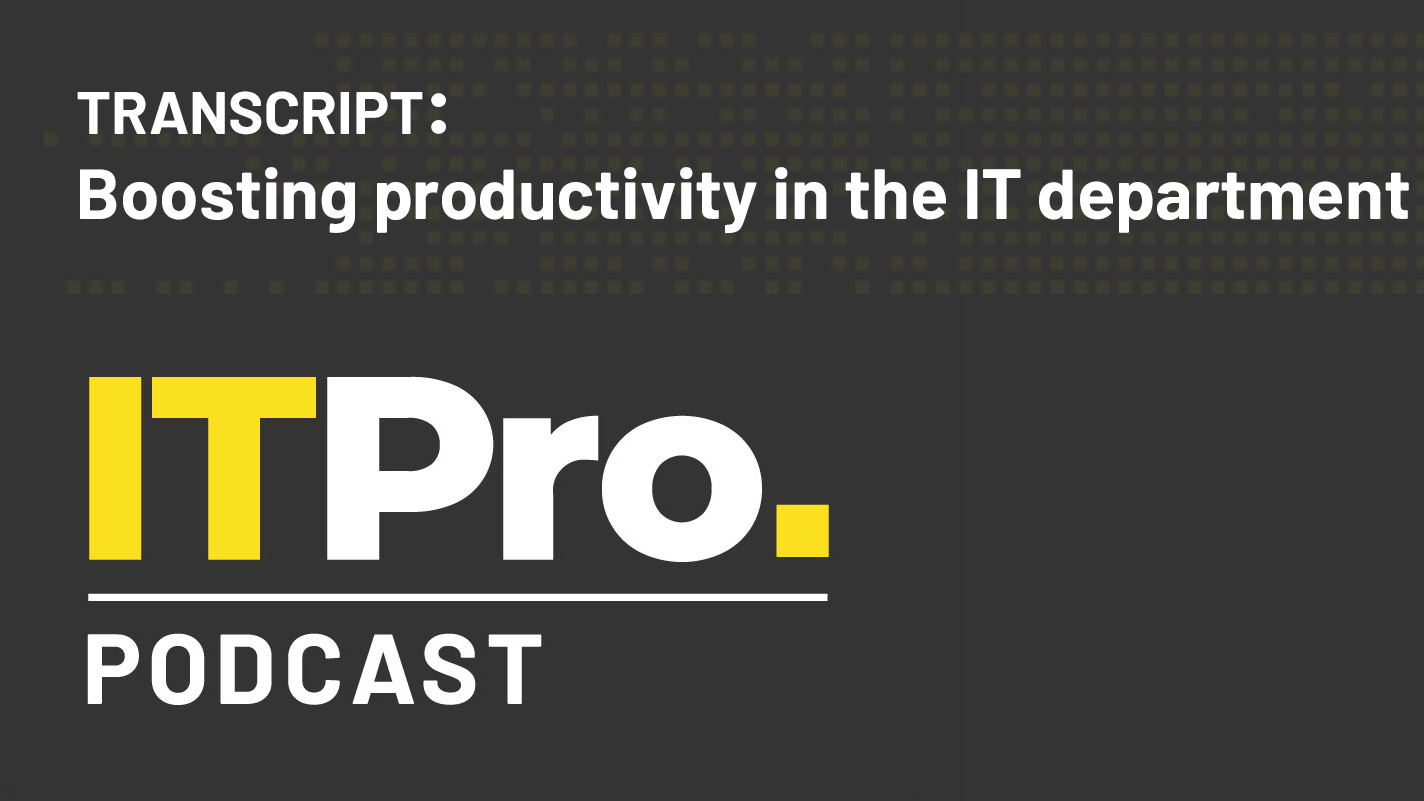
This automatically-generated transcript is taken from the IT Pro Podcast episode ‘Boosting productivity in the IT department'. We apologise for any errors.
Rory Bathgate
Hi, I'm Rory Bathgate.
Jane McCallion
And I'm Jane McCallion.
Rory
And you're listening to the IT Pro Podcast, where today we're talking about productivity. As the skill shortage continues to bite into IT departments, every business looks to use its resources as efficiently as possible and empower employees to be as productive as possible while not leaving them overworked.
Jane
Improperly organised work stacks, insufficient collaboration and a failure to adapt to changing work environments are all factors that can impact productivity. Today we’re speaking with Christian Lund, co-founder at productivity tech firm Templafy, to discuss the main concerns around productivity in the current landscape and the role that automation and AI can play in alleviating some of these problems. Christian, thanks for being on the show.
Christian Lund
Thanks a lot for having me.
Rory
So just to start with a broad question, how can we measure productivity?
Sign up today and you will receive a free copy of our Future Focus 2025 report - the leading guidance on AI, cybersecurity and other IT challenges as per 700+ senior executives
Christian
Well, you can measure productivity, especially in time. How much time is being spent, how much time goes into productivity? And also, there is also a relativity to it to some extent, because it also measures against “how else could you be using that time that you're spending on doing a particular part of work”. So I would say those are probably the two, the two main ones. It then translates into a lot of other things like revenue, for example, which is maybe the most important for many businesses.
Rory
I think when a lot of businesses are looking at quantifying productivity, there's quite a few threads that can be pulled in those areas. Right now we're looking at a skill shortage and workers are perhaps having to ramp up their productivity to make up for absences in a company. With that in mind, how can an IT decision maker look to assess productivity in their team to maybe alleviate those concerns down the line?
Christian
Well I think the first thing that people do in businesses in general, and certainly in IT as well, is to look at the actual tasks that requires to be done inside of a business, and then try to figure out from that perspective the types of resources that is required to go into that. I think that's probably a starting point. And to your point, right now what we're seeing a lot is that you're really trying to see how much, how well you can spend your use your resources, also both from a people perspective, and also from a technology perspective, and really find the right balance between the two. Because oftentimes, what technology does is that it supports the productivity that, you know, it adds to the productivity, that the productivity, it adds to the productivity capabilities of people.
Jane
So I guess, do productivity and efficiency sort of go hand in hand if we're talking about use of time, I guess, as well as outcomes?
Christian
I think you're pointing to the right area there. Because productivity, as I said before, is very much oftentimes put directly in connection with time. It's a place where you can save time, or as efficiency oftentimes takes it a little bit further. What you do with that time, then translates into something else, for example, revenue. So it's more outcome focused. And I think that's really the difference. One of the differences between the two, that the efficiency piece really have a big look at not only how fast it was to do it, but also how well it works once you've done it. And what technology can do as well, again, is to oftentimes combine those two things really well.
Jane
So the IT industry and IT departments have, as Rory mentioned, faced all kinds of skill shortages recently. Can using technology, can increase in productivity, patch those holes or is it an 'as well as' rather than an 'instead of' filling those roles,
Christian
You know, to add to the productivity in essence, what it does when you add productivity, more productivity to your work, is that it allows you to essentially spend your brain better. So if you're a knowledge worker, for example, all the stuff that you have to go through that takes time, that you can then do more with higher productivity, actually adds efficiency to that pool. So in that sense, I think definitely yes. Because you allow you really allow to allocate the resources in a better place. And with knowledge workers especially, instead of having them to do you having them do tedious jobs or things that can be automated, or that way you can add productivity to it with technology, you can allow them to focus on on more relevant things that are actually focused more on efficiency. So I think the answer is yes.
Rory
So looking at productivity, breaking it down into as you've been saying, individual areas that can be done better, you're talking about breaking it up into drain on, drain on finances but also drain on time. Is productivity as much of a workspace problem as it is a worker problem?
Christian
Well, I think it can be, as well with a workspace, I think it comes on the other hand in, you know, in two forms, because you could argue that depending on on your workspace, and my understanding of that is where you actually work, where you physically go to work, how that how that influences you? Well, on one hand, that can be like very positive for productivity, I think, because it oftentimes come comes with a lot of energy and there is extra things you can get from that, that kind of actually ends up with you being more productive. There's also faster ways to get to information because you have your people right there, and things like that. So there's that side to it. But there's obviously also the other side to it, that having to go to work, you also get into chatty situations with people, you end up sometimes spending a little bit of time that you shouldn't have, of course you need to do the commute to even get there, and so on. So it kind of comes, it kind of goes both ways. But either way, I would say if that is done well or not, technology can still play a pretty big role in terms of supporting you in the way that you that you work and collaborate with your co workers also inside of a workspace.
Jane
Can we expand on that a little bit more in terms of, we've sort of danced around a little bit, what sort of technologies are we talking about when it comes to increasing productivity?
Christian
Well, I guess that again depends very much on the type of work that you do. But I can tell you sort of the example from the world that I come from, and which is very much focused on knowledge workers. So one particular thing that people if your knowledge workers do, if your knowledge worker do a lot, is to document your work through documents. That's kind of what they're for. So the way that knowledge workers can do that is really only that, because they don't have buildings to show, or furniture to show. They need to document their work through documents. And that is perhaps one of those areas that, you know, time is just being spent so much like in pretty much all knowledge worker areas that is producing documents is one of those areas where companies are really looking to add productivity to their work. So they don't have to spend so much time on undoing that piece, and they can do more of their real job, which is typically not actually doing documents. It's kind of a prerequisite to to document what they do.
Jane
And when you speak about knowledge workers, does this include the IT department?
Christian
Yeah, it does include the IT department as well. But actually the IT department, oftentimes in knowledge worker industries, is also serving as a good decision maker for providing the right tools and technologies, obviously, for the people that they co-work with. So they're kind of doubled, because they also of course need to do this type of work. But they also need to consider how they can support and help the organisations with the best possible technology for them to be more productive and ultimately also efficient. So it kind of plays both ways, in that piece, too. But some of those good technologies that are out there for productivity and efficiency, for certain also has a lot of productivity pieces built into them that helps the administration, that helps IT for deployment and updating, and things like that there are done well.
Rory
So when we're talking about these specific technologies that are used to increase productivity, are we primarily talking about automating workflows, are we talking about consolidating stacks into a maybe a more of a collaborative space? What specific changes are we talking about in regards to increasing productivity?
Christian
Yes, I think you're hitting on some of those, the two ones that are that are really important, because one are the ones that actually do and go in and actually support you with being more productive. Like, for example, tools that will automate the way that you build up business documents, or you build out quotes or you have other types of processes that you need to go through where automation plays a big role and really helps the end user focus on other things than going through those tedious tasks, and focus on on what they're actually hired for. And then at the same time, there's the consolidation piece where in order for that to work, oftentimes, many technologies need to work together. Because going through processes where you, for example, piece together a business document, you would oftentimes need to combine different types of data from different sources to piece that together on that canvas that ultimately is the output that you're looking to do. And in order to do that, of course, as an IT person you would need to make the right decisions in terms of combining those technologies in the best way to make sure that the end result is as productive and efficient as possible for the business.
Jane
And you know, Rory mentioned automation there. Is there a role to play for AI within this? I know it's everybody's favourite buzzword.
Christian
There is, obviously there is a very strong role for AI to play around these, you know, around productivity in general because it's what it does. I mean, automation, if you look back sort of in history, the first piece of automation were kind of people not having to use their hands so much, because these machines could take over and automate a lot of that work. And that is really what is travelling into the brains now where, with AI obviously, where the automation that frees up brainpower to do other stuff, as I've said a couple of times now. So there's a lot of opportunity for that to happen. And we see obviously now with OpenAI, ChatGPT and other services coming out. That is, it's moving super fast forward. And I think the new discussion then is, what can it be used for and where are the limitations that you really need to consider in terms of how to apply this best, not the least in in a business or an enterprise context where there are other things to consider as well. And on that note, it's oftentimes a combination. Because using the example as I've used a couple of times now, with the business document, what that ultimately is is a combination between different stakeholders that you need to serve for. There is the security part that needs to make sure that it follows the, you know, regulations and compliance standards of the company, there is a brand new piece that you take into account. And there is then all the rest that actually builds the business document. And the rest is then oftentimes a combination between very structured data that you have inside of your CRM system like Salesforce or similar, and then all the information that lives on the intranet, which is where really ChatGPT comes in. And ultimately, it's a combination of all those things to make it work. So AI alone, at least as it is today, will not take you all the way at least in a business context. It helps you with all the information that is available out there, unless you have like a very specifically trained model that only focuses on a certain area. But ChatGPT for example, unbelievable capacity in terms of supporting people with all the extra things in the, I would say the 'bespoke stuff' that goes into, for example, a business document can be super helpful. But all the very structured part, it can't really touch because it sits behind very strong walls inside of the business. So it's really about finding that right balance between exactly how can we apply this in the best possible way to support people being more productive all the way through. But the potential, obviously enormous.
Jane
I've got to say that if I put myself in the shoes of a technologist, while AI is quite exciting and it does definitely have a place it's already running in some places quite, quite helpfully and usefully, it seems quite expensive. So are AI systems, I guess when you think about a return on investment type idea, is it actually something at this point that is mature enough and good value for money enough that it's actually worth IT decision makers thinking about spending their budget on?
Christian
Well, it's difficult to be black and white on that in my opinion, because for some areas yes, it is very strong. And it's also not necessarily super expensive. It depends on how much you can leverage what exists already, like we've seen more recently with some of those technologies coming out that are more open source. But if it's worthwhile or not, or if it pays well, on the return on investment calculation, it really needs to go into the specifics on what you need to use it for. And I think one thing that oftentimes happens, I've seen many times in my career, is that you need to consider, you need to figure out what you're trying to achieve first, and then figure out if AI is the right thing for you to do it. Because there's also a tendency for that to become like a thing on its own. And it's not really necessarily super relevant, there might be other ways where you can automate a lot of things in maybe more structured ways that does not require AI, but will still take you to the end goal a lot faster and a lot, lot cheaper. So it's really about figuring out how to how to apply those things. I think where AI comes in extremely handy and will in the future, are these more complex areas where you really need to think, and compile, and put together a lot of different information incredibly fast and pieced together, and something that makes reason like we've seen with ChatGPT being a very good example of being unbelievably capable of. That is where I think it's really strong, but many of, I would say the more normal automation tasks that companies are looking at, there are many other ways than just AI to support those and to get to the same types of efficiency and productivity gains.
Rory
Something that strikes me when we're talking about large language models such as, I mean you've named ChatGPT as one example is that we're discussing them in the context of productivity, rather than say, end-to-end automation or worker replacement. So on this point of identifying the specific areas where maybe AI would be required versus where it wouldn't be required, are you envisioning more of a collaborative approach in the future where specific AI tools are used alongside human workers, rather than replacing them entirely? More of a productivity boost, rather than just a pure output boost?
Christian
Yes, I think definitely that it will be collaborative. And there are certainly, you know, certain industries or types of roles that are more exposed to these types of things than others, obviously. But in general I think that's the case, yes, that it requires still a very strong involvement of people from any of those things. And again, if you look at one role as an example could be like a seller, that goes out and sells a product. That person would, of course, still be incredibly important in the interaction with that person on the other side it is, that's kind of how those things work. But all the stuff that goes into enabling that person to be where that person needs to be, and how this person can improve and understand better which areas to improve in and so on, there are many ways that can support that person in getting better and ultimately allowing that person to do more of what that person is supposed to be doing, which is selling and not, for example, doing quotes and proposals and other stuff that kind of falls into into becoming like a successful successful salesperson, as well. So I think that the combination is really strong, but there are certainly areas where industries, we need to consider what to do also, with the people capacity that they will have in the future, the brain capacity that they would need to think about how to use in a better way.
Jane
Yeah, I guess it kind of strikes me when we talk about technologies like this, that computers didn't put typists out of work, they put typewriters out of work, and cars put horses out of work. The people tend to stick around at least for a while, while things change. Is that how it's likely to be with AI do you think?
Christian
Yes, it is. But it's also slightly different, because there is another type of... it is called artificial intelligence for a reason. So it kind of it adds an extra layer to that. On the other hand, we know as well that, at least for now, we're kind of always a little bit ahead. So it looks back on the language models, for example, that were mentioned earlier earlier here in this show that the they are looking at things that were available to a certain point in time. And it's combining that with good information that kind of gets you to here, but there is still kind of, you know, it's it's hard to get into the forward thinking kind of thing. And being ahead of the game, that's kind of the the advantage of the human right now. But let's see how that how that changes over time. It is going to be interesting to follow, but for now I think what it does really is that it opens up unbelievable opportunity for headspace, to use headspace better, because it frees up that. It takes away all the stuff that you wouldn't really be having to think about or do that others can do, so you can think about the stuff that it can't think about, and start doing more of that. And that's back to the point of let's make sure that people do their real jobs. And hopefully, they will do those jobs a lot better, and have all the support from AI and other stuff to get them to get them to where they need to be.
Rory
There's a report that was recently released, that was looking at concerns of IT decision makers, of CIOs, CTOs. And in that it was noted that a major effect on productivity is just being had by the fact that currently people are having to do the jobs of two people in their role. They're having to out up fires where normally they would be working effectively. So we can, you know, we can talk around some of the tech aspects, but also to go back to what we were saying in the introduction about the skill shortage it's clear that the skill shortages is having a profound effect on productivity. Do you think that some of the technology that we've talked about has the potential to help maybe less skilled workers become more productive, and help fill these roles as well as help people in existing roles become more productive.
Christian
Well maybe. I think what's more interesting is the other way around, that more skilled people can grasp over more areas, to put it in that way. So the skills shortage coming in as like, "I need to fill out two people's jobs". But, you know, the the other way to look at that is that where automation and technology can play in is to make those jobs easier to do in terms of the cumbersomeness that goes into it, and make it more like at least for some areas, like thinking jobs. Which means that you can widen out the bandwidth, essentially, of the most skilled people you have. So I think it kind of goes, you know, plays both ways. But being also a business person, I think it's it's attractive that you can use the skills of your best people more, make sure that they spread across bigger areas, because they typically have the best understanding as well of what you're trying to do. So it also goes in that direction, but for sure everybody will be will be lifted with better technology. Yes.
Jane
I suppose one of the ways I think that I've heard it described before is that technology or any kind of automation takes over the dangerous and dirty jobs, but also the kind of tedious bits of kind of manually filling out an Excel spreadsheet - other spreadsheet platforms are available - or, you know, that kind of thing that is time consuming, but doesn't really do very much and also makes you bored.
Christian
Yes exactly, I think that is where that is one of the biggest areas where you would see AI and automation excel. And we're seeing that already, right now with those exact things. Because it's information workers, typically highly paid information workers that are put into positions where they need to do tedious jobs, like the ones you just said. Filling out Excel spreadsheets, or building out business documents, piecing together things that require their time, but it's not really what adds value to what they're trying to do. So that's why there's so much focus on really, how can we eliminate the work that goes into that piece of creating documents? Again, documents are not going away you still need to document the work that has been done. But it's just that you don't have to do it, and I think that movement is really going on right now, on getting rid of all the stuff that automation could do for you so you can do your real job.
Rory
On the point of making specific processes more efficient, specific processes more productive in the hands of individuals. Where's the line drawn between a process that you can look at and say, "okay, this requires a more efficient individual input" - whether that's by automation, or you're giving an individual templates that they can they can work with - And those that require more of a centralised approach. So those that you need to step back and say, "okay, the problem here is the workflow", or "the problem here is the stack that this is situated in". Is there a specific line you can draw between those two? Or does that really vary depending on the company?
Christian
Well, I think there is, and it's kind of... if it's when you, before we spoke about what's the difference between productivity and efficiency. And the other side to this that might come in here is also risk. And once you kind of add a risk layer to it, that's where it becomes very, something that you typically look at from a centralised perspective, its governance and risks. Yes, we want people to be productive, but we cannot do it at the cost of risk. So we cannot put more risk upon ourselves by doing these things. And that is where it oftentimes goes into this centralised, very governing perspective of doing that. Whereas the more you go into the productivity and efficiency area, it tends to get closer and closer to the almost the end user, that needs to do do more with what they have today. So we definitely see that distinction. And for example, I mentioned before how if you have like 80 million documents produced every year in a company, one thing is that part of those documents need to serve for proposals and ended up being like deals with signatures on. A lot of them do a lot of other stuff, but all of them need to follow certain standards. You know, you cannot have things that were from an information security perspective, that does not like live up to the standards of your company, and you lose information into the wrong hands and things like that. You need to have that governance layer while you think about productivity at the same time. So this is the example of just the document piece, but I think that goes in a more generic layer as well. The ability to combine those things and the need and request from the business to be more productive, to be more efficient, and to balance that out with also making sure that you have control. And you avoid risk and do that in the same time. That is, those are typically very interesting discussions. And I think the best technologies out there, you know, cover exactly that. That goes both ways, do not leave anyone outside, but make sure that yes we can provide productivity efficiency, but we do it while you also have the opportunity to govern what you need to do well,
Jane
It looks like we are going into a recession and whatever is happening, whether it's that or through inflation, or a bit of both IT departments are having their budget squeezed. Can automation perhaps help IT departments, companies as a whole, use their resources and money more effectively even if it means an initial outlay?
Christian
Short answer is yes, I think the change that is happening with this, and again, we've been touching upon efficiency, productivity against each other, I think efficiency has been really strong. With the whole uptake that we saw over the past quite a few years now. Because it was so driven towards, you know, outcome and in many businesses growth and those types of areas. Whereas productivity is something that also plays in really well when you need to, you know, obviously have a better look at or a stronger look at your cost to make sure that you really are diligent in terms of how you spend your money. So I think it's trending towards that, back again now towards being more focused on the productivity side. How can we save time and be more efficient with the resources that we have, rather than doing something that helps us, you know, optimise for efficiency and growth towards for example selling more. So the good thing about this area is that it kind of plays both ways. You could use it for saving costs, or you can use it for growing your business. And right now, I think businesses are really looking to invest in this because it is something that helps them save cost.
Jane
Well, unfortunately, that's all we have time for this week. But thank you once again Christian for coming on the show.
Christian
Thanks. Thanks again for having me.
Rory
As always, you can find links to all of the topics we've spoken about today in the show notes and even more on our website at itpro.co.uk.
Jane
You can also follow us on social media, as well as subscribe to our daily newsletter. Don't forget to subscribe to the IT Pro Podcast wherever you find podcasts. And if you're enjoying the show, why not tell a friend or colleague about us?
Rory
We'll be back next week with more from the world of IT, but until then, goodbye.
Jane
Bye.
ITPro is a global business technology website providing the latest news, analysis, and business insight for IT decision-makers. Whether it's cyber security, cloud computing, IT infrastructure, or business strategy, we aim to equip leaders with the data they need to make informed IT investments.
For regular updates delivered to your inbox and social feeds, be sure to sign up to our daily newsletter and follow on us LinkedIn and Twitter.
-
 Workers are wasting half a day each week fixing AI ‘workslop’
Workers are wasting half a day each week fixing AI ‘workslop’News Better staff training and understanding of the technology is needed to cut down on AI workslop
-
 Everything you need to know about Claude Cowork, including features, pricing, and how to access the new productivity tool
Everything you need to know about Claude Cowork, including features, pricing, and how to access the new productivity toolNews Users can give Claude Cowork access to specific folders on their computer, allowing the bot to autonomously sort and organize files in the background while you're working away.
-
 Can robots work safely alongside humans? This one industry leader thinks we're not far away
Can robots work safely alongside humans? This one industry leader thinks we're not far awayNews Humanoid robots and people will be able to work truly side-by-side this year, according to the CEO of one leading robotics company.
-
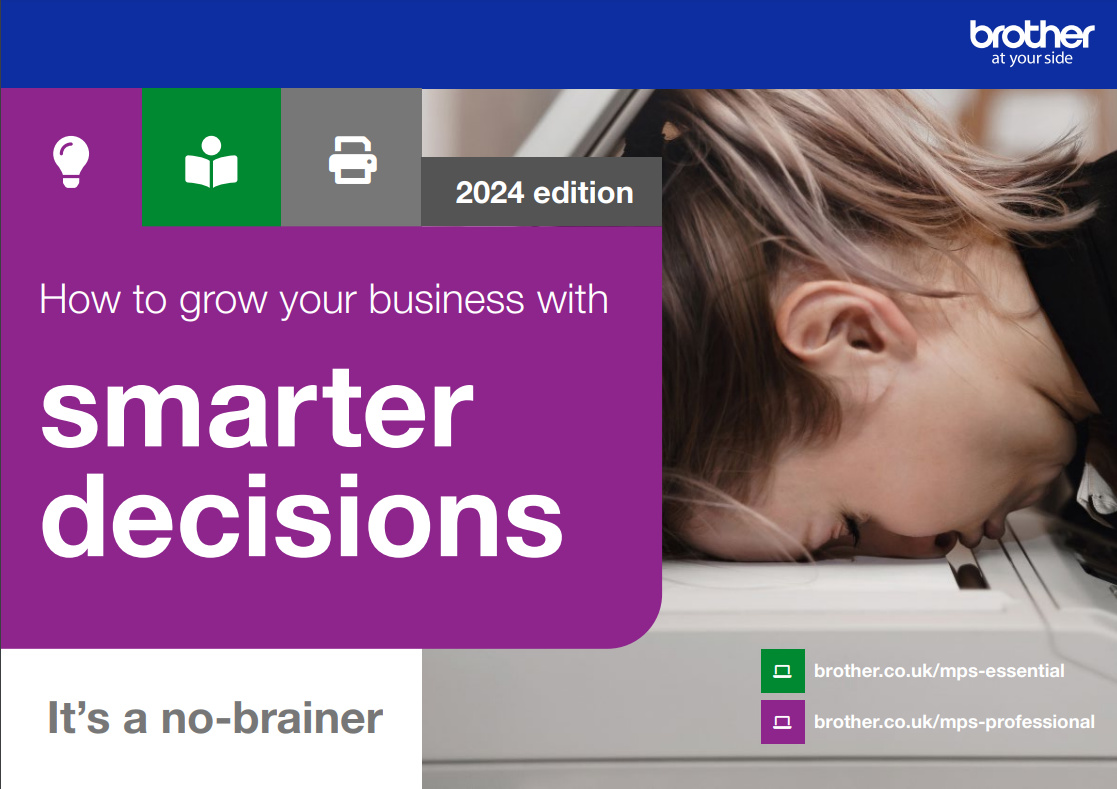 How to grow your business with smarter decisions
How to grow your business with smarter decisionsWhitepaper Introducing changes that generate business growth in the face of economic uncertainty for a stronger, more cohesive future
-
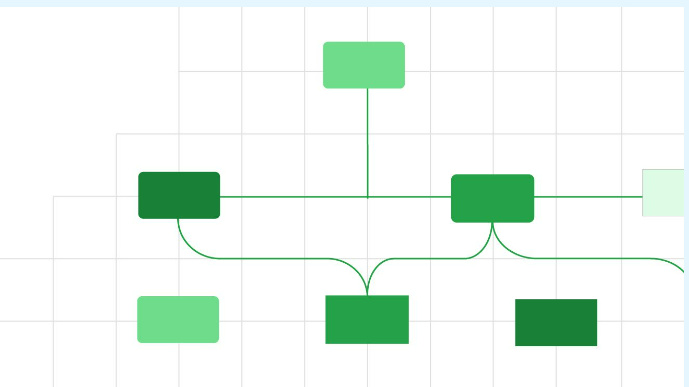 The power of AI & automation: Proactive IT
The power of AI & automation: Proactive ITWhitepaper Automation strategies to dynamically and continuously assure cost-effective application performance
-
 Magic Quadrant for enterprise conversational AI platforms
Magic Quadrant for enterprise conversational AI platformsWhitepaper An evaluation of the conversational AI platform (chatbot) market
-
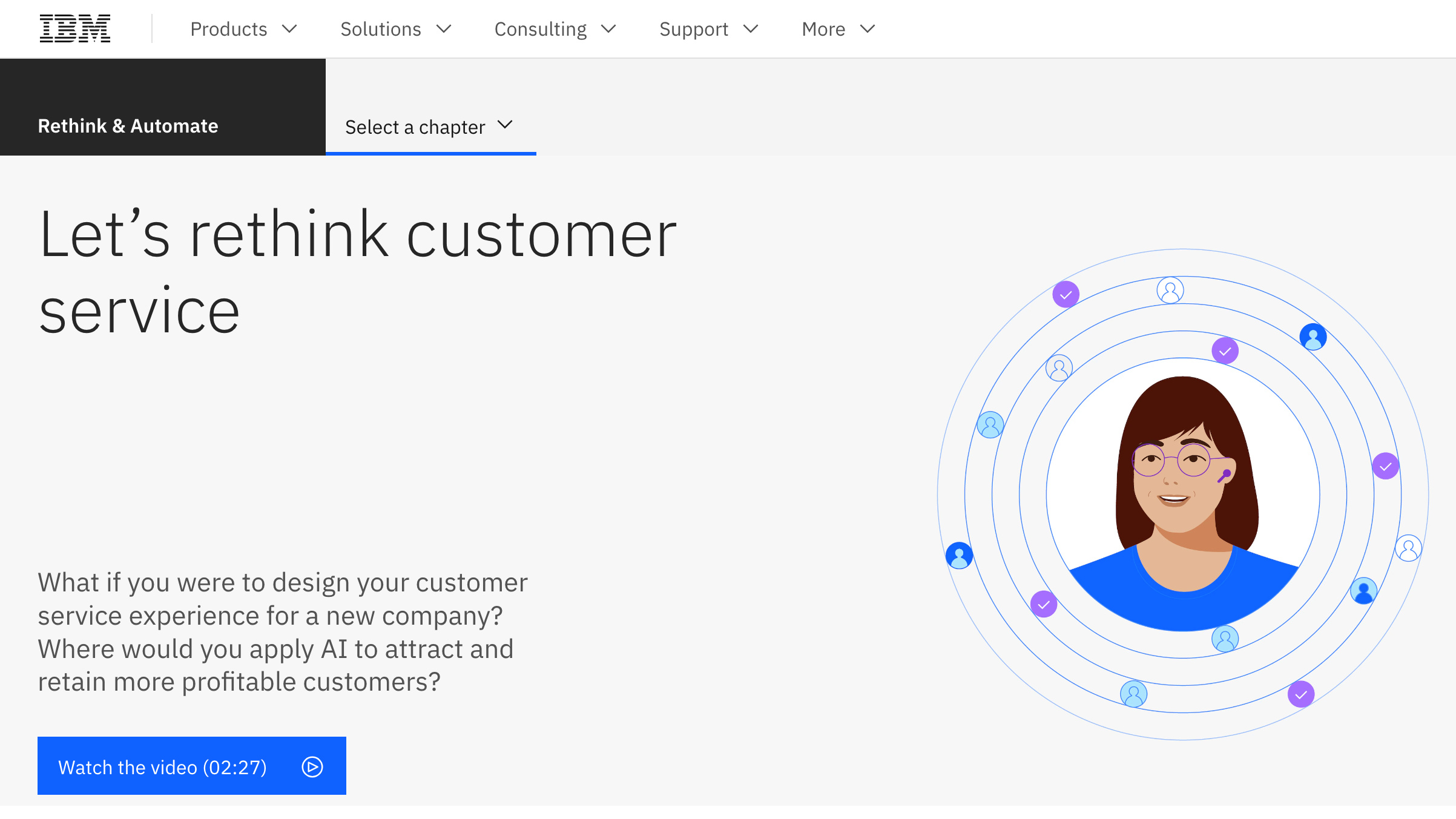 Let's rethink customer service
Let's rethink customer servicewhitepaper Discover new ways to improve your customer service process
-
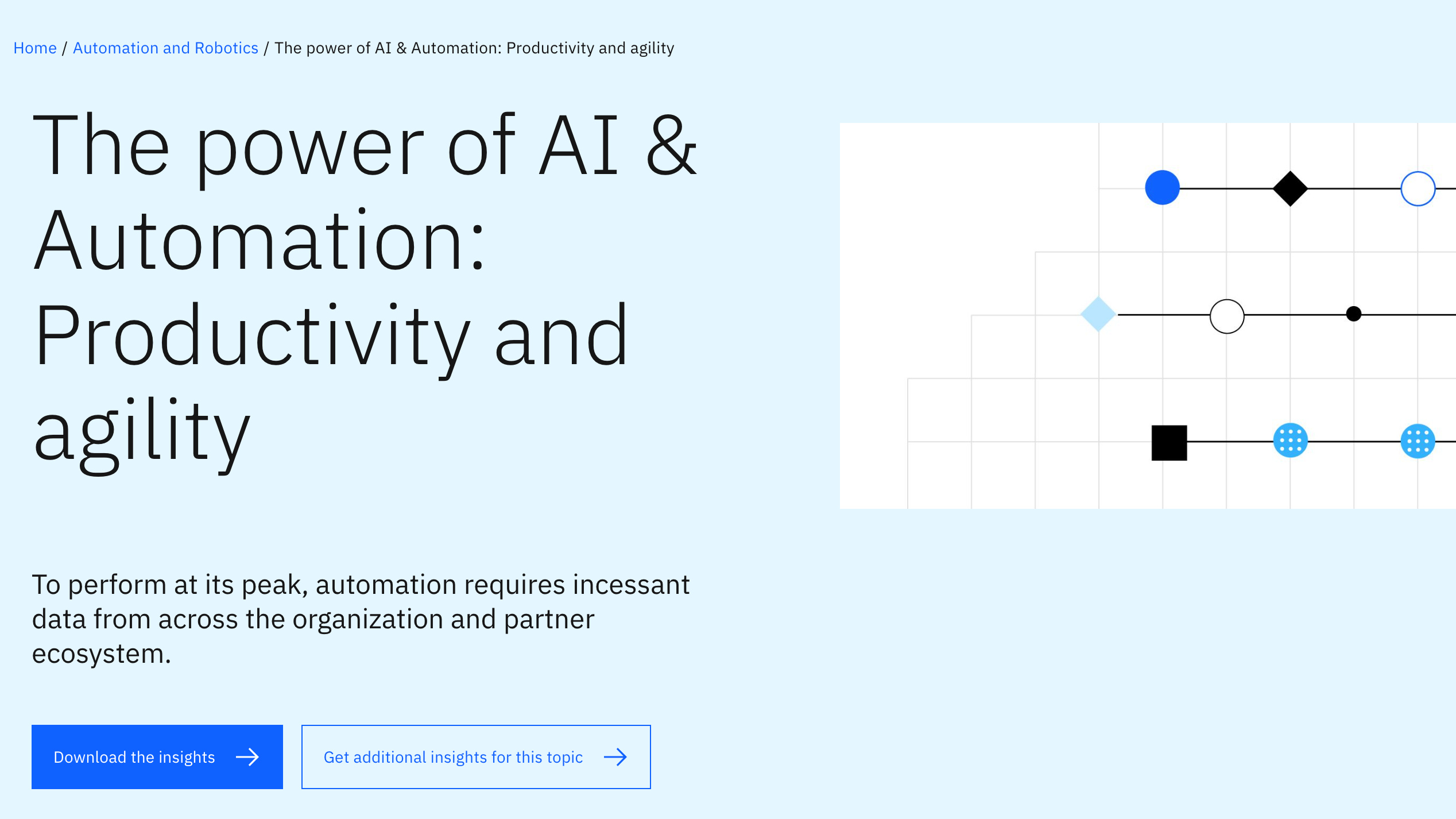 The power of AI & automation: Productivity and agility
The power of AI & automation: Productivity and agilitywhitepaper To perform at its peak, automation requires incessant data from across the organization and partner ecosystem



